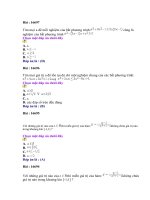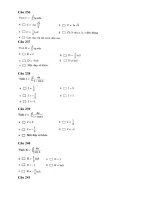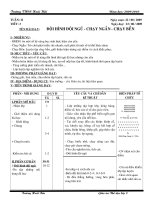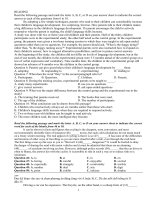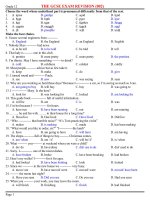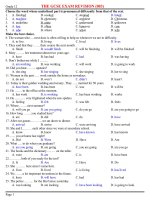GCSE 333
Bạn đang xem bản rút gọn của tài liệu. Xem và tải ngay bản đầy đủ của tài liệu tại đây (73.33 KB, 5 trang )
SƠ GD&ĐT VINH PHUC
TRƯƠNG THPT LIÊN SƠN
(Đề thi gồm: 05 trang)
ĐỀ KTCL ƠN THI THPT QUỐC GIA NĂM 20182019
Mơn: TIẾNG ANH – ĐỀ SỐ 333
Thời gian làm bài: 60 phút, không kể thời gian phát
đề
Ho va tên thi sinh:……………………………………………………………………. SBD:…………………………
Mark the letter A, B, C, or D on your answer sheet to indicate the sentence that best completes
each of the following exchanges.
Question 01: ~ A: “____________” ~ B: “Nonsense! He’s just an apprentice in my father’s workshop.”
A. Was that man following you the whole morning?
B. Has your dad divorced three times so far?
C. That boy seems to be wooing for you, Peggy.”
D. Can I make acquaintance with that cool-looking boy?
Question 02: ~ A: “How can I boil these eggs, Mum?” ~ B: “____________”
A. Keep them in the fridge for later use.
B. Quite easy. Just put in some water and boil for ten minutes.
C. First, stop at the gas then get some snack food.
D. Serve this instanly with salt and pepper.
Read the following passage and mark the letter A, B, C, or D on your answer sheet to indicate
the correct word or phrase that best fits each of the numbered blanks from 03 to 08.
El Nino, the weather phenomenon that can unleash devastating floocs and droughts, is
(03)_______ to return this spring, but how harmful it might be is unclear, US government weather
forecasters said on Thursday.
Forecasters at the National Oceanic and Atmospheric Administration (04)_______ the
prediction based on readings of warmer water in the Pacific Ocean. The last El Nino episode in
1997-98, considered extremely severe, was (05)_______ for rearing droughts in Australia, the
Philippines and Indonesia and floods in Peru and Ecuador.
At this point, it is too early to predict if this El Nino might develop along the same lines as
the 1997-98 episode, or be weaker,” said Vernon Kousky, a weather specialist with the federal
agency.
El Nino, meaning “boy child” in Spanish, is an abnormal (06)_______ of waters in the Eastern
Pacific Ocean that usually happens once every two or seven yean. First reported by Latin
American fisherman, the anomaly was named after the Christ's child because it was usually seen
(07)_______ Christmas. El Nino can have a major impact on wind and rainfall patterns around the
world causing storms, droughts and crop failures.
Question 03: A. likely
B. possibly
C. easily
D. surely
Question 04: A. took
B. did
C. made
D. got
Question 05: A. thought
B. taken
C. blamed
D. regarded
Question 06: A. warmth
B. heating
C. heat
D. warming
Question 07: A. around
B. in
C. about
D. on
Mark the letter A, B, C, or D on your answer sheet to indicate the underlined part that needs
correction in each of the following questions.
Question 08: The best-known members of the cabbage vegetable group includes head cabbage,
cauliflower, and broccoli.
A. includes
B. best-known
C. cauliflower
D. vegetable
Question 09: "How far does it take to get to the office?" ~ "About one hour, I think."
A. About
B. How far
C. it take
D. the
Question 10: Never in the history of humanity has there been more people living on this relatively
small planet.
A. has
B. living
C. relatively
D. of humanity
Mark the letter A, B, C, or D on your answer sheet to indicate the word(s) CLOSEST in meaning
to the underlined word(s) in each of the following questions.
Question 11: This latest scandal has left the actress with egg on her face.
A. in shame
B. looking stupid
C. with a blush
D. at grimace
Question 12: At fifty-five, he began life again, determined with his pen to wipe out the debt.
A. give up
B. bump off
C. pay off
D. rub out
Mark the letter A, B, C, or D on your answer sheet to indicate the correct answer to each of the
following questions.
Question 13: Have you ever read________ "Oliver Twist", ________ interesting novel written by Charles
Dickens?
A. the/ the
B. Ø/ an
C. Ø/ Ø
D. an/ the
Question 14: The stolen jewels were________ a lot of money.
A. worth
B. valued
C. priced
D. cost
Question 15: "Which of the two boys is a boy scout?" ~ "________ of them is."
A. All
B. Neither
C. None
D. Both
Question 16: My brother is intelligent but he________ common sense.
A. fails
B. misses
C. wants
D. lacks
Question 17: I think you should stay________ while listening to classical music.
A. peaceful
B. quiet
C. calm
D. tranquil
Question 18: Rheumatic fever can be a crippling disease; ________ the name is misleading. There is
normally no, or little, fever experienced by sufferers.
A. because
B. however
C. otherwise
D. unless
Question 19: Our lack of interest in the project had nothing to do with money but came from the
fact that since graduation we________ fairly regularly. Thus, for most of us an anniversary party had
no special attraction.
A. have been met
B. were meeting
C. had met
D. have been meeting
Question 20: The child was told to eat all his vegetables or________ he would get no ice cream.
A. in fact
B. instead
C. in case
D. else
Question 21: His________ of the school regulations really can’t be ignored any longer.
A. inattention
B. disregard
C. carelessness
D. unfamiliarity
Question 22: We have been working hard. Let’s________ a break.
A. take
B. do
C. find D. make
Question 23: I am________ tired to think about that problem at the moment.
A. much more
B. nearly
C. far too
D. simply
Question 24: It is believed________ causes weight loss.
A. much stress that B. much stress
C. it is much stress D. that much stress
Question 25: None of us has ever________ of cheating in class.
A. approved
B. declared
C. persisted
D. concluded
Mark the letter A, B, C, or D on your answer sheet to indicate the word that differs from the
other three in the position of primary stress in each of the following questions.
Question 26: A. criteria
B. industry
C. elephant
D. mechanise
Question 27: A. curriculum
B. auditorium
C. professional
D. peninsula
Mark the letter A, B, C, or D on your answer sheet to indicate the sentence that best combines
each pair of sentences in the following questions.
Question 28: You need to study your vocabulary words. You can do well on the quiz.
A. First, you need to study your vocabulary words, then you can do well on the quiz.
B. In order to study your vocabulary words, you should do well on the quiz.
C. You need to study your vocabulary words, so that you can do well on the quiz.
D. If you need to study your vocabulary words, you can do well on the quiz.
Question 29: You eat your vegetables. You cannot have dessert.
A. Until you eat your vegetables, you cannot have dessert.
B. Unless you eat your vegetables, you cannot have dessert.
C. You may not eat your vegetables because you cannot have dessert.
D. If you don’t eat your vegetables, you cannot have dessert.
Mark the letter A, B, C, or D on your answer sheet to indicate the word(s) OPPOSITE in
meaning to the underlined word(s) in each of the following questions.
Question 30: She walked in as cool as a cucumber, as if nothing had happened.
A. very calmly
B. on tiptoes
C. down in the mouth
D. in a fever
Question 31: In 1864 George Pullman designed a sleeping car that eventually saw widespread
use.
A. previously
B. familiarly
C. simultaneously
D. ultimately
Read the following passage and mark the letter A, B, C, or D on your answer sheet to indicate
the correct answer to each of the questions from 32 to 38.
Being aware of one’s own emotions - recognizing and acknowledging feelings as they
happen - is at the very heart of Emotional Intelligence. And this awareness encompasses not only
moods but also thoughts about those moods. People who are able to monitor their feelings as they
arise are less likely to be ruled by them and are thus better able to manage their emotions.
Managing emotions does not mean suppressing them; nor does it mean giving free rein to
every feeling. Psychologist Daniel Goleman, one of several authors who have popularized the
notion of Emotional Intelligence, insisted that the goal is balance and that every feeling has value
and significance. As Goleman said, "A life without passion would be a dull wasteland of neutrality,
cut off and isolated from the richness of life itself." Thus, we manage our emotions by expressing
them in an appropriate manner. Emotions can also be managed by engaging in activities that cheer
us up, soothe our hurts, or reassure us when we feel anxious.
Clearly, awareness and management of emotions are not independent. For instance, you
might think that individuals who seem to experience their feelings more intensely than others
would be less able to manage them. However, a critical component of awareness of emotions is
the ability to assign meaning to them - to know why we are experiencing a particular feeling or
mood. Psychologists have found that, among individuals who experience intense emotions,
individual differences in the ability to assign meaning to those feelings predict differences in the
ability to manage them. In other words, if two individuals are intensely angry, the one who is
better able to understand why he or she is angry will also be better able to manage the anger.
Self-motivation refers to strong emotional self-control, which enables a person to get
moving and pursue worthy goals, persist at tasks even when frustrated, and resist the temptation
to act on impulse. Resisting impulsive behaviour is, according to Goleman, "the root of all
emotional self-control."
Of all the attributes of Emotional Intelligence, the ability to postpone immediate
gratification and to persist in working toward some greater future gain is most closely related to
success - whether one is trying to build a business, get a college degree, or even stay on a diet. One
researcher examined whether this trait can predict a child’s success in school. The study showed
that 4-year-old children who can delay instant gratification in order to advance toward some
future goal will be "far superior as students" when they graduate from high school than will 4year-olds who are not able to resist the impulse to satisfy their immediate wishes.
Question 32: The word "them" in paragraph 3 refers to________.
A. individuals
B. psychologists
C. intense emotions D. individual differences
Question 33: In paragraph 3, the author explains the concept of awareness and management of
emotions by________.
A. giving an example of why people get angry
B. comparing how two people might respond to an intense emotion
C. explaining why some people are not aware of their emotions
D. describing how people learn to control their emotions
Question 34: According to paragraph 5, children might be more successful in school if they can resist
impulses because they can________.
A. focus on their work and not get distracted
B. have more friends at school
C. be more popular with their teachers
D. easily understand new information
Question 35: From paragraph 2, we can see that Daniel Goleman________.
A. studied how people manage their emotions
B. wrote about Emotional Intelligence
C. treated patients who had emotional problems
D. trained people to increase their Emotional Intelligence
Question 36: The word "critical" in paragraph 3 is closest in meaning to________.
A. dynamic
B. inessential
C. indecisive
D. important
Question 37: All of the following are mentioned in paragraph 2 about our emotions EXCEPT________.
A. we can manage our emotions
B. every feeling is important
C. emotions are part of a satisfying life
D. we should ignore some feelings
Question 38: Which of the following can we infer from paragraph 1?
A. If people pay attention to their feelings, they will not be able to manage them.
B. People who can manage their emotions will be controlled by them.
C. Some people can understand their feelings better than others.
D. If people pay attention to their feelings, they can control their emotions better.
Read the following passage and mark the letter A, B, C, or D on your answer sheet to indicate
the correct answer to each of the questions from 39 to 45.
In this era of increased global warming and diminishing fossil fuel supplies, we must begin
to put a greater priority on harnessing alternative energy sources. Fortunately, there are a
number of readily available, renewable resources that are both cost-effective and earth-friendly.
Two such resources are solar power and geothermal power.
Solar energy, which reaches the earth through sunlight, is so abundant that it could meet
the needs of worldwide energy consumption 6,000 times over. And solar energy is easily
harnessed through the use of photovoltaic cells that convert sunlight into electricity. In the United
States alone, more than 100,000 homes are equipped with solar electric systems in the form of
solar panels or solar roof tiles. And in other parts of the world, including many developing
countries, the use of solar systems is growing steadily.
Another alternative energy source, which is abundant in specific geographical areas, is
geothermal power, which creates energy by tapping heat from below the surface of the earth. Hot
water and steam that are trapped in underground pools are pumped to the surface and used to
run a generator, which produces electricity. Geothermal energy is 50,000 times more abundant
than the entire known supply of fossil fuel resources. And as with solar power, the technology
needed to utilize geothermal energy is fairly simple. A prime example of effective geothermal use
is in Iceland, a region of high geothermal activity, where over 80 percent of private homes are
heated by geothermal power.
Solar and geothermal energy are just two of a number of promising renewable alternatives
to conventional energy sources. The time is long overdue to invest in the development and use of
alternative energy on a global scale.
Question 39: The word”tapping” is synonymous with________.
A. knocking
B. making use of
C. hitting
D. burying
Question 40: According to the passage, why should we consider using alternative energy sources?
A. Because conventional energy sources are being depleted, and they cause environmental
damage.
B. Because global warming has increased the amount of sunlight that reaches the earth.
C. Because fossil fuels are no longer available.
D. Because they are free and available worldwide.
Question 41: According to the passage, what can be inferred about solar roof tiles?
A. They can convert geothermal power to electricity.
B. They contain photovoltaic cells.
C. They are more expensive than solar panels.
D. They are being used in many undeveloped countries.
Question 42: What is the main topic of this passage?
A. Two types of alternative energy sources that should be further utilized.
B. Examples of the use of energy sources worldwide.
C. The benefits of solar and wind power over conventional energy sources.
D. How energy resources are tapped from nature.
Question 43: According to the passage, which of the following is true about solar power?
A. It is being used in 100,000 private homes worldwide.
B. It is 6,000 times more powerful than energy from fossil fuels.
C. There is enough of it to far exceed the energy needs of the world.
D. There is very little of it available in Iceland.
Question 44: The word ‘harness” is closest in meaning to________.
A. develop
B. blindfold
C. control for use
D. tie up
Question 45: Which word below is antonymous with “abundant”?
A. rich
B. immense
C. rare
D. scarce
Mark the letter A, B, C, or D on your answer sheet to indicate the sentence that is closest in
meaning to each of the following questions.
Question 46: I am sure that they are not expecting us this early.
A. If we arrive this early, they are not there. B. We should arrive early or they will expect us.
C. They may not like us to arrive late.
D. They can’t be expecting us this early.
Question 47: The way he behaves annoys me sometimes.
A. His behaviour is annoying to me.
B. I was annoyed with his way of behaving.
C. I find his behaviour very annoying. D. I’m sometimes annoyed by the way he behaves.
Question 48: It is an undeniable fact that children watch too much TV.
A. It’s obviously true that children spend too much time watching TV.
B. It’s undeniable that too many children watch TV.
C. It can’t be denied that children watch too many TV programmes.
D. It’s undeniable that children don’t watch enough TV.
Mark the letter A, B, C, or D on your answer sheet to indicate the word whose underlined part
differs from the other three in pronunciation in each of the following questions.
Question 49: A. chamois
B. champagne
C. machine
D. chores
Question 50: A. serious
B. famous
C. lousy
D. nervous
_________THE END__________
